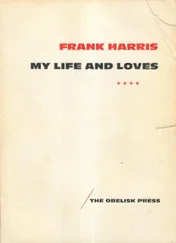Frank Harris - My life and loves Vol. 2
Здесь есть возможность читать онлайн «Frank Harris - My life and loves Vol. 2» весь текст электронной книги совершенно бесплатно (целиком полную версию без сокращений). В некоторых случаях можно слушать аудио, скачать через торрент в формате fb2 и присутствует краткое содержание. Жанр: Эротика, Секс, на английском языке. Описание произведения, (предисловие) а так же отзывы посетителей доступны на портале библиотеки ЛибКат.
- Название:My life and loves Vol. 2
- Автор:
- Жанр:
- Год:неизвестен
- ISBN:нет данных
- Рейтинг книги:4 / 5. Голосов: 1
-
Избранное:Добавить в избранное
- Отзывы:
-
Ваша оценка:
- 80
- 1
- 2
- 3
- 4
- 5
My life and loves Vol. 2: краткое содержание, описание и аннотация
Предлагаем к чтению аннотацию, описание, краткое содержание или предисловие (зависит от того, что написал сам автор книги «My life and loves Vol. 2»). Если вы не нашли необходимую информацию о книге — напишите в комментариях, мы постараемся отыскать её.
My life and loves Vol. 2 — читать онлайн бесплатно полную книгу (весь текст) целиком
Ниже представлен текст книги, разбитый по страницам. Система сохранения места последней прочитанной страницы, позволяет с удобством читать онлайн бесплатно книгу «My life and loves Vol. 2», без необходимости каждый раз заново искать на чём Вы остановились. Поставьте закладку, и сможете в любой момент перейти на страницу, на которой закончили чтение.
Интервал:
Закладка:
But alas! He, too, was a snob and loved the dignities and flatteries, if not the empty ceremonials, of a provincial German court. Fancy a great man and one of the wisest of men content to sit on that old feudal wall in court attire and dangle buckled shoes and silken hose in the eyes of the passers by beneath him. Oh, Beethoven was right in his revolt when he crammed his hat down on his head as the Gross-Herzog drove by, while Goethe stood on the roadside, hat in hand, bowing. When Beethoven's brother put on his card Gutsbesitzer (land-owner), Beethoven put on his card Hirnbesitzer (brain-owner): the brainowner cannot be proud of being a landowner.
Goethe had not sufficient reverence for his own genius, and though well-off, did not make the best of his astounding gifts. He should have visited England and France early in life and spent at least two years there. If Goethe had known Blake, he might have won to the heights earlier and understood that he must give his own spirit the richest nourishment; for surely Blake's first songs would have shown him that even a Goethe had worthy competitors and thereby would have rendered the tedious Wander-jahre that were not, alas! spent in travel, altogether impossible; for even at sixteen Blake had reached magic of expression. In describing eventide he writes: … Let thy west wind sleep on The lake; speak silence with thy glimmering eyes And wash the dusk with silver…
This "natural magic," as Matthew Arnold called it, is the one quality which Goethe's poetry never showed. Yet though consciously seeking the utmost self-development, how high Goethe grew even in the thin soil of Weimar.
As a lyric poet he ranks with the greatest of all tune; no one has ever written a more poignant dramatic lyric than the appeal of Gretchen to the Madonna; and Mignon's confession is of the same supreme quality. Heine says that Goethe has written the best lyrics in all literature, and Heine knew. But it was Goethe the thinker who won my heart; phrases of his, couplets even, seemed to me pure divination. There is one word about him that I envy. When Emerson was confronted by his insight into botany and into biology, he found the true word for the great German: "Surely the spirit that made the world, confided itself more to this man than to any other."
In sociology, too, Goethe deserves the high praise of Carlyle, and not mainly even for the discovery of the "open secret" that too great individual liberty leads inevitably to slavery (Coleridge saw as far as that and writes of those who Wear the name of Freedom Graven on a heavier chain, but because he (Goethe) was the first to draw the line between socialism and individualism and apportion to each its true place in the modern industrial world. I make no scruple of reproducing the passage here for the second time; it has never, so far as I know, been quoted by any sociologist or even noticed; and I had arrived at the same conclusion years before reading the fragment of the play Prometheus, that contains the deepest piece of practical insight to be found anywhere.
"What then is yours?" Epimetheus asks; and the answer of Prometheus comes like a flash- "The sphere that my activity can fill, no more, no less."
In other words, every department of industry that the individual can control should be left to him; but all those where the individual has abdicated, all joint stock and limited liability companies, should be nationalized or municipalized; in other words, should be taken over by the community to be managed in the interest of all. Joint stock company's management has every fault of state or municipal management and none of then-many virtues and advantages, as Stanley Jevons proved in a memorable essay now nearly forgotten.
In this magnificent apercu Goethe was a hundred years before his time, and considering that in the first years of the nineteenth century modern industry was in the cradle, so to speak, and gave scarcely a sign of its rapid and portentous development, Goethe's insight seems to me above praise. Of course he saw, too, that the land and its inherent products, such as oil and coal, should belong to the community.
It should teach us all the inestimable value of the seer and thinker that Goethe, though far removed from the main current of industrial life, should have found the true solution of the social problem a full century before any of the belauded European statesmen! What a criticism of democracy in the bare fact!
I owe more to Goethe than to any other teacher: Carlyle came first and then Goethe. Carlyle, who only knew two men in the world worthy of respect, the workman and the thinker, the two iron chords out of which he struck heroic melody; and Goethe, who saw even further and was the first to recognize that the artist was the greatest of the sons of men: his destiny the most arduous, prefiguring as it does, the ceaseless mother-labour of creation, the desire which is the soul of life to produce and produce, ever reaching outward and upward to a larger and more conscious vision; and when the critics complain that Goethe was too self-centred, they forget how he organized relief for the starving weavers, or worked night after night to save the huts of Thuringen peasants from fire.
And his creative work is of the best: his Mephistopheles is perhaps too generalized, just as Hamlet is too individual, to rank with Don Quixote or Falstaff; but look at his women, his Gretchen, Mignon and Philina; only Shakespeare's Cleopatra and perhaps his Sonnet-Love are of the same quality.
I am annoyed whenever I hear Homer, who is not as great as our Walter Scott, placed among the first of men: to me the sacred ones are Jesus, Shakespeare and Goethe; even Cervantes and Dante, though of the same high lineage, are hardly of the same stature; for Cervantes has given us, strange to say, no new type of woman, and Dante is singer rather than creators; whereas Goethe and Shakespeare are supreme singers as well as creators; and on the Head of the Crucified One climb the crowns of the world.
For my own part and speaking merely personally, I would find a place for Balzac and Heine even in that high company; and who would dare to exclude Rembrandt, Beethoven and Wagner?
One small point which differentiates Goethe from Shakespeare:
Shakespeare followed Jesus in insisting on repentance, whereas Goethe will have no sorrow for sin: what is past, is past, he says peremptorily, and tears are a waste of time: train yourself so that you will not fall twice into the same pit; and go forward boldly. The counsel is of high courage: yet sorrow, too, is the soul's purification.
But what a counsellor is this Goethe:
Einen Blick in's Buch hinein
Und zwei in's Leben
Das muss die rechte Form
Dem Geiste geben.
In Gottingen I learned a good many of the peculiarities of German university life and spent more time on the Pauk-boden (duelling-ground) and with the corps-students than in socialist meetings. Thanks to my excellent German, I was admitted everywhere as a German and soon discovered the cause of the extraordinary superiority of the German students in almost every department of life. I think the discovery of value because it enabled me to predict the colossal development of German industry and German wealth twenty years before it took place.
The Emperor of Germany of that time, the grandfather of the present man, must have had a rarely good head or he would never have found a Bismarck and given him almost royal power. But his wisdom was shown, I am inclined to think, just as clearly in another field. Desirous above all things of strengthening his army, he called Wilhelm von Humboldt, the brother of the famous scientist, Alexander, to counsel. What should be done with the ever increasing number of students who year by year entered the army? Von Humboldt recommended that they should form a class apart as volunteers and be subjected to only one year's training instead of three. At first the old Kaiser would not hear of it: they would be inferior, he thought, to the ordinary soldier in drill and discipline. "All my soldiers must be as good as possible," was his final word. Von Humboldt assured him that the volunteers for one year would soon constitute the pick of the recruits, and he argued and pleaded for his conviction with such fervour that at length the old Emperor yielded. Von Humboldt said that a certain proportion, twenty per cent at any rate, of the volunteers would become non-commissioned officers before their year was over; and the Emperor agreed that if this happened, the experiment must be regarded as successful. Of course the first volunteers knew what was expected of them and more than fifty per cent of them gained the coveted distinction. All through the army the smartest soldiers were the one-year volunteers. It was even said later that the smartest non-commissioned officers were for the most part volunteers, but that is not generally believed, for the German is very proud of his non-commissioned officers and with good reason; for they serve 16 years with the colours, and as they are rewarded afterwards with good positions on the railways, or in the post-office or the police, and indeed may even rise to esteem as gentlemen, they form the most remarkable class in any army. I have known a good many German non-commissioned officers who had learned to speak both English and French fluently and correctly while still serving.
Читать дальшеИнтервал:
Закладка:
Похожие книги на «My life and loves Vol. 2»
Представляем Вашему вниманию похожие книги на «My life and loves Vol. 2» списком для выбора. Мы отобрали схожую по названию и смыслу литературу в надежде предоставить читателям больше вариантов отыскать новые, интересные, ещё непрочитанные произведения.
Обсуждение, отзывы о книге «My life and loves Vol. 2» и просто собственные мнения читателей. Оставьте ваши комментарии, напишите, что Вы думаете о произведении, его смысле или главных героях. Укажите что конкретно понравилось, а что нет, и почему Вы так считаете.






![William Frith - John Leech, His Life and Work. Vol. 1 [of 2]](/books/747171/william-frith-john-leech-his-life-and-work-vol-thumb.webp)
![William Frith - John Leech, His Life and Work, Vol. 2 [of 2]](/books/748201/william-frith-john-leech-his-life-and-work-vol-thumb.webp)




